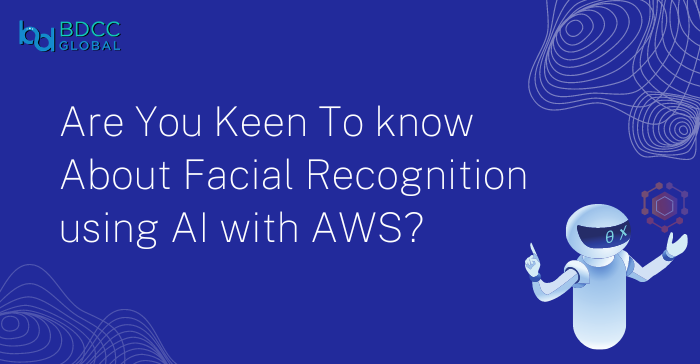
Amazon Web Services brings “Amazon Rekognition”, a perfect solution-based service leveraging Artificial Intelligence (AI). It is designed and developed to perform accurate Image Analysis on various applications. It uses deep learning to improve scalability while analyzing multiple images within seconds.
“Blending AI with AWS; Amazon Rekognition Can Perform Accurate Facial Recognition”
So how does Amazon Rekognition work? What advantages does Amazon Rekognition offer? In this post, we’ll discuss everything about building a unique face recognition service with the capabilities of AWS and Amazon Rekognition.
The Concept of Facial Recognition With AI & Deep Learning
Artificial Intelligence (AI) revolves around developing intelligent devices that can perform tasks like humans. Deep learning, a function of AI, imitates the human brain’s capabilities and processing power to make certain decisions.
Facial Recognition using AI and Deep Learning adds up a device’s capability of identifying a tagged feature set of images. Essentially, the images must have existing correlations with the device and its user. Facial Recognition capability in devices is mainly utilized to identify the device owner’s identity.
So how exactly does AI contribute to Facial Recognition? AI breaks down the images into numerous data points, and Deep Learning guides the device to match the exact data points among multiple image variations. A well-developed AI Facial Recognition system works in real-time to identify the desired images under any condition.
How Does Amazon Rekognition Utilize AI with AWS For Facial Recognition?
Amazon Rekognition matches the Faces based on the visual geometry and relationship between various facial features such as the eyes, brows, nose, lips, mouth, etc. It starts analyzing the images based on the outlines around the face. It is called the “Bounding Box”, which Amazon Rekognition analyses further.
“Amazon Rekognition can perform highly accurate image and video analysis on all types of applications and devices.”
After analysis, Amazon Rekognition produces object notation numbers or data points that indicate the precise locations of all significant facial elements. When someone runs a face search, the technology of AI with AWS comes into use.
AI compares the data sets to train the device/application with the Deep Learning function to compare and identify the source image from various image searches. From there, other AWS services like Amazon Lambda and Amazon DynamoDB integrate with Amazon Rekognition to build an ideal face recognition solution!
Creating Unique Face Recognition Service Using Amazon Rekognition
Amazon Rekognition enables application owners to build a unique face recognition service with their own image collections. Be it for automating identity detection within an image library, for creating user-based access control, or for any other use cases, it is the perfect blend of AI with AWS. The following workflow shows the process of building a face recognition solution using Amazon Rekognition:
Indexing Implementation
The first job to implement the face recognition solution is to import all image collections of faces to the Amazon S3 bucket. Configure the Image Object Metadata with a unique name and upload the trigger to AWS Lambda Indexer. It then sends an IndexFaces request to Amazon Recognition. Once it receives the Response Data in return, it populates the Index Values in Amazon DynamoDB. The most popular indexing strategies are Face Match, Face Verification, and Social Tagging.
Analysis
The process of hovering through large-scale data collections for potential matches within the index is called Analysis. Once the user submits a Face Search request, Amazon Rekognition performs facial recognition using AI and other associated AWS services. It tried to detect the most prominent face from all image collections.
Enhancements
What happens when an image contains the faces of multiple people? Amazon Recognition then runs an enhanced search for each facial bounding box and submits them individually for further analysis. One can also use the Lambda function in AWS and rerun face detection continuously. Simply put, Enhancement help detect faces within an extensive image collection.
Advantages of Face Recognition Using Amazon Rekognition
Efficient security
Amazon Rekognition makes user identity verification quick and efficient. It is more secure than other biometric technologies such as passwords, retina scans, signatures, fingerprints, etc. It also leverages multifactor authentication to offer additional security benefits.
Improved accuracy
Face recognition using AI with AWS offers accurate results by correctly identifying individual faces from extensive image collections. It can detect an individual’s face among multiple faces in one image.
Easier integration
As most devices have built-in support software code for facial recognition, Amazon Rekognition can be easily integrated with any application software. Hence, it is compatible with all types of applications and devices.
How To Apply Facial Recognition Responsibly?
Indeed, Amazon Rekognition is a powerful face recognition solution that can identify individual identities accurately. Still, it should not be used to violate someone’s privacy and individual rights. Given the seriousness of public safety, some practical applications of Amazon Rekognition include:
- Fraud detection
- Cyber security enhancements
- Unauthorized access restriction
- Airport and border control
- Banking
- Healthcare sector
Hence, Face Recognition using Amazon Rekognition should not be used autonomously.
Conclusion
Amazon Rekognition is the perfect blend of AI with AWS, offering a customizable and pre-trained Face Recognition Solution with additional computer vision capabilities. It is safe, accurate, and insightful. It can analyze faces from millions of photos or videos accurately. It can perform facial comparisons to authenticate the user’s access remotely. It can create home automation experiences using Deep Learning and AI.
Get started with a custom-built facial recognition solution using AWS and Artificial Intelligence.

